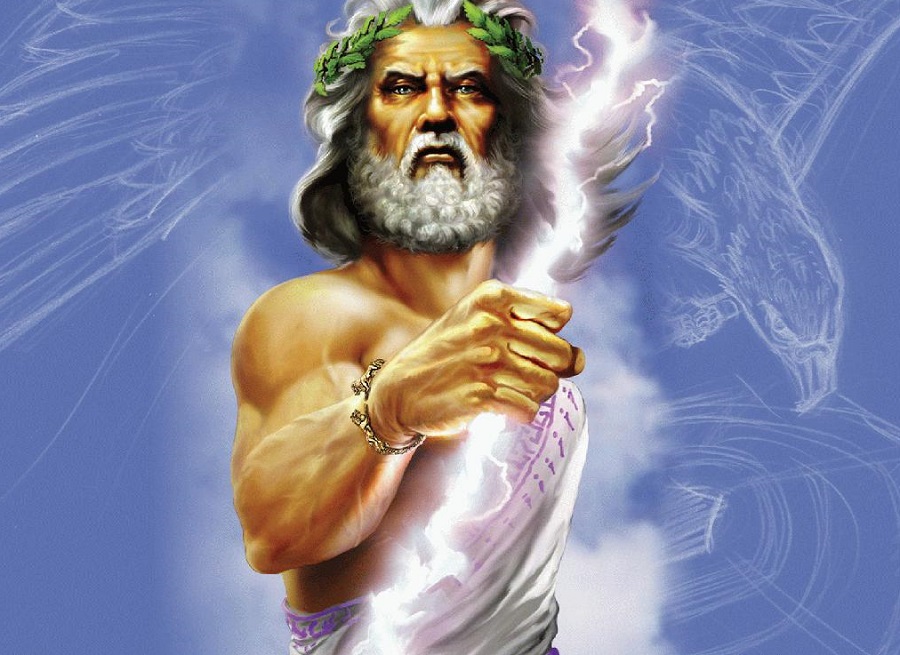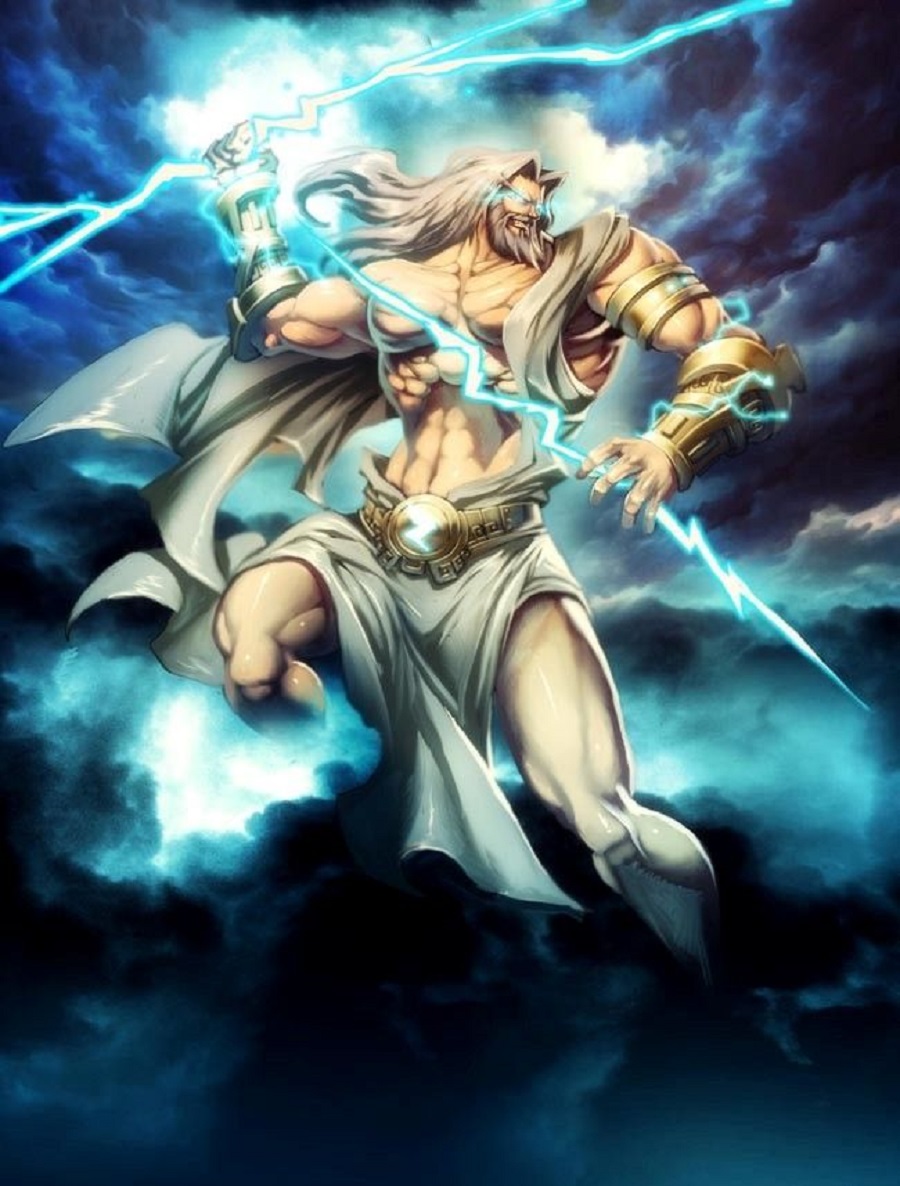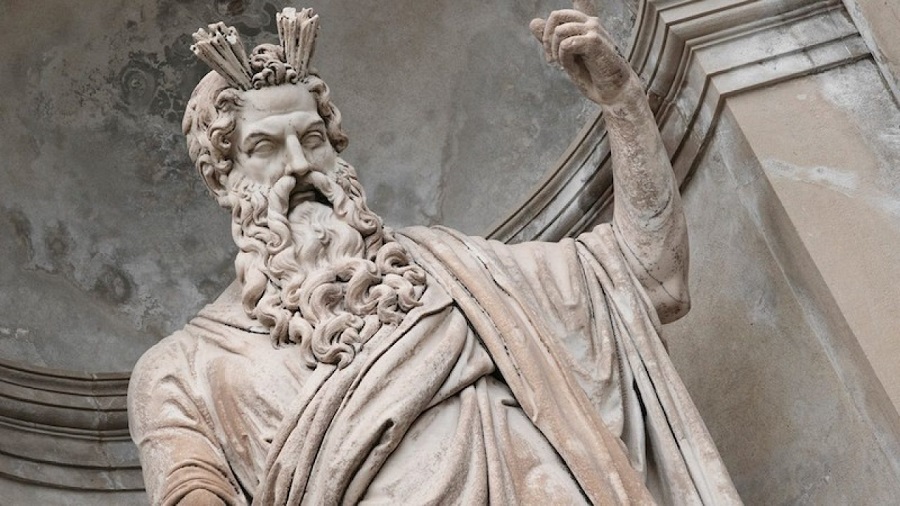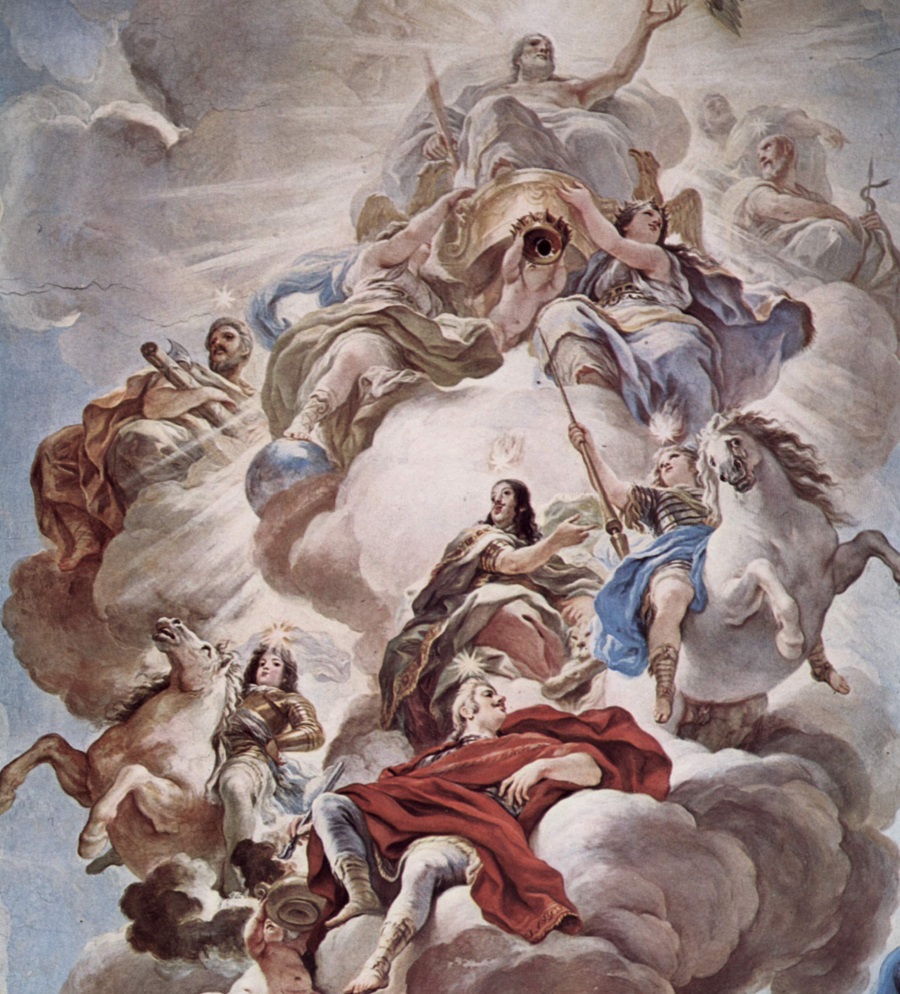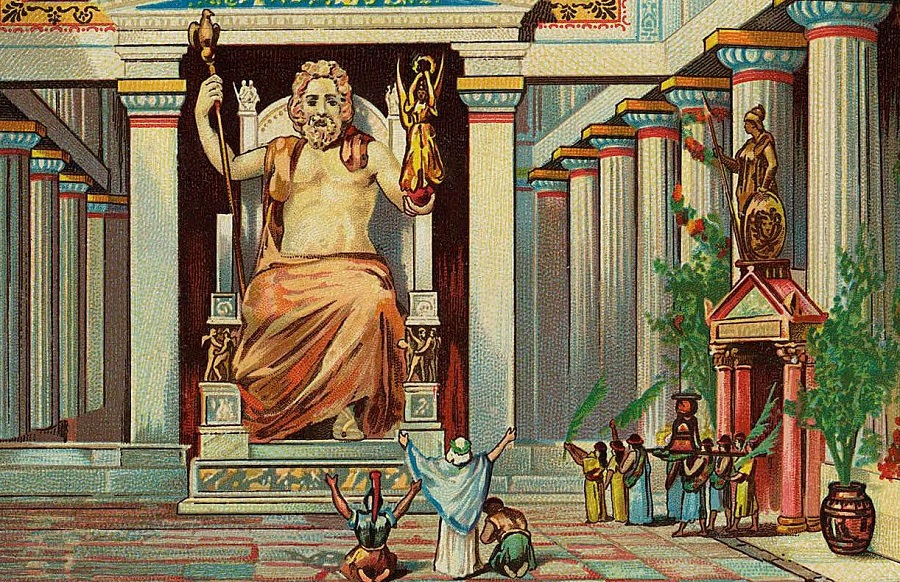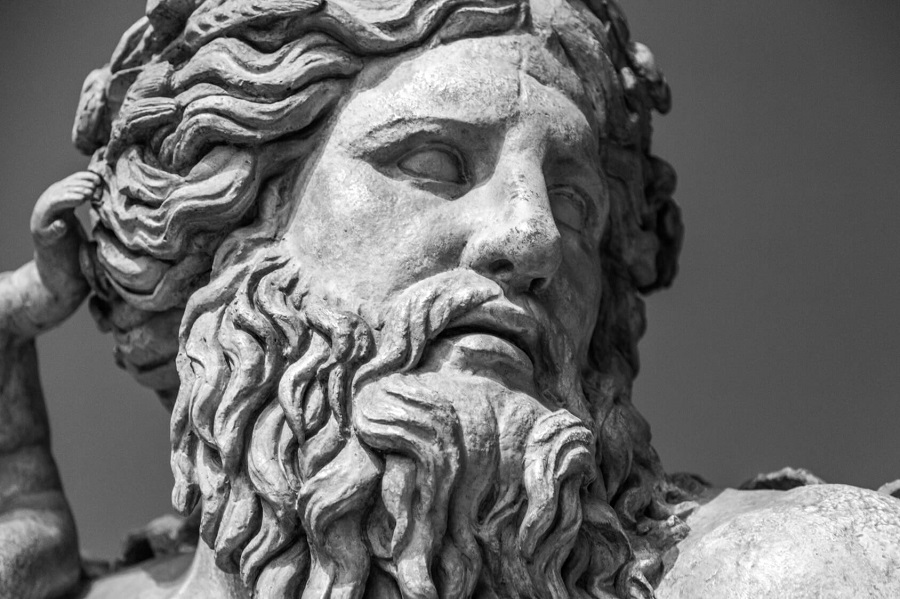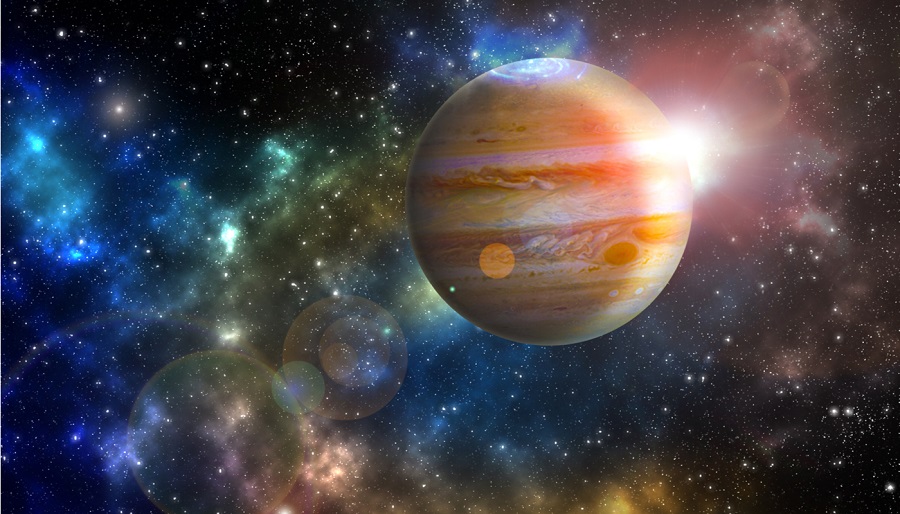When the Romans arrived in Greece, they in part adopted for themselves the religious beliefs of this culture, so they established a kind of copy with respect to their deities. And this is how the supreme god of the Greeks Zeus, in Roman beliefs would represent the god jupiter, this article will show you a bit about it.
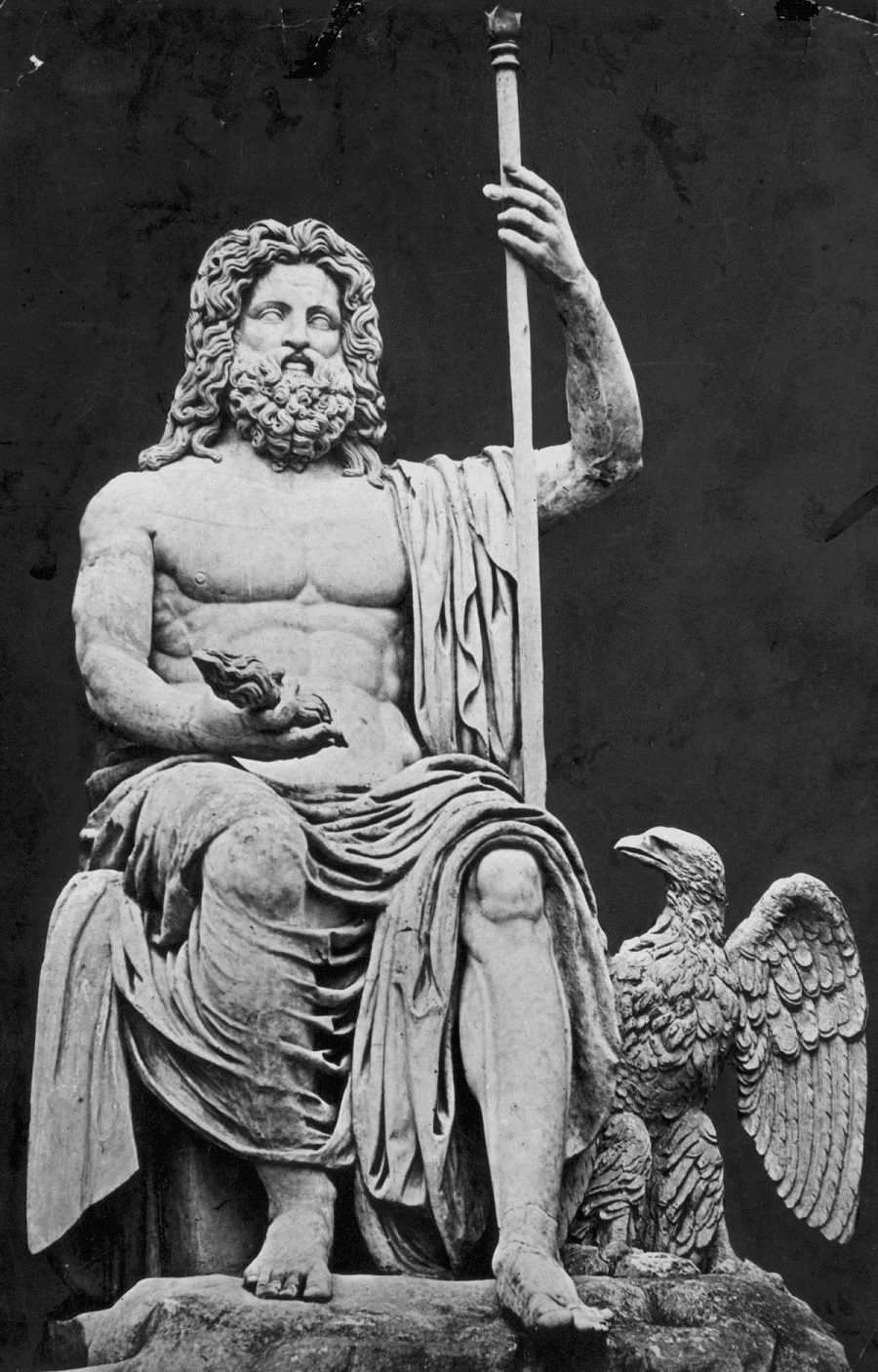
god jupiter
According to Roman mythology, the god Jupiter is the king. In fact, he is often referred to as the king of the gods. He may not be the original creator of the mythological creatures that dominated Roman lore and tales; that distinction belongs to his father Saturn. But Jupiter is the primordial man, just like Zeus in Greek mythology.
Mythology dominated the religious culture in Rome until the moment when Christianity prevailed. So before that happened, the god Jupiter was the primordial god that was worshipped. He was the god of the sky and together with the help of the kings of the time, he established the principles of the Roman religion.
This god bears many similarities to Zeus and the Greek myths were not limited to his connections with the sky and lightning. The god Jupiter was the brother of two other gods: Neptune and Pluto. Like the Greeks, each of these three gods controlled a realm of existence: the sky (Jupiter), the sea (Neptune), and the underworld (Pluto), with Jupiter being the most powerful.
Etymology and epithets
In Latin, the name "Jupiter" was usually translated as Iūpiter or Iuppiter (the character "j" was not part of the old Latin alphabet and was added in the Middle Ages). The name has two roots: one was the Proto-Indo-European word dyeu- (the same root as the name "Zeus"), meaning "bright thing", "sky" or "day" (as in Latin it means day dies); the other was pater, a word shared by Greek and Latin meaning "father." In keeping with these naming conventions, Jupiter was sometimes called Diespiter or Dispiter.
Also, Zeus was called Zeu Pater in Greek and Sanskrit speakers used the term Dyaus pitar (father of the skies) to refer to the sky god. All of this points to an archetypal "heavenly father" deep in the history of Indo-European-speaking peoples, whose identity was localized by cultures that fragmented over time. Jupiter was known by various epithets, including:
- For bringing victory, he was Iuppiter Elicius or "Jupiter who bestows light."
- To produce lightning, it was Iuppiter Fulgur or "Jupiter lightning".
- To bestow light and radiance on all things, he was Iuppiter Lucetius, or "Jupiter of Light," as well as Iuppiter Caelestis, or "Jupiter of the Heavens."
- Above all, he was Iuppiter Optimus Maximus: "Jupiter, the greatest and the greatest."
From
Jupiter's origins were largely identical to the tales of Zeus's creation. Before Jupiter, Saturn reigned as the god of the sky and the universe. Of course, it hasn't always been this way, for before Saturn, his father Caelus (meaning "heavens") ruled, but Saturn overthrew his father and took control of the heavens for himself.
After that, Saturn married Ops and left her pregnant, so when he found out through a prophecy that foreshadowed his fall at the hands of one of his children. He took the measure to prevent the usurper from seeing life, so he swallowed the first five children that emerged from Ops's womb. So when the last child finally emerged, Ops hid it and gave Saturn a stone wrapped in cloth, so an unsuspecting Saturn devoured the rock whole.
What followed was the worst case of indigestion in the history of mythology. Unable to digest the rock, Saturn regurgitated it, along with the five children he had swallowed: Ceres, Juno, Neptune, Pluto, and Vesta. Meanwhile, Jupiter had been plotting the impending demise of his father, which he planned with the help of his brothers and sisters. Immediately the fall of Saturn came at the hands of the god Jupiter, who immediately took control of the cosmos.
However, much later the god Jupiter would find himself in the same position as his father, Saturn. So after forcibly taking Metis and impregnating her, the god Jupiter was overcome with fear that his own unborn child might overthrow him. To avoid that fate, Jupiter swallowed Metis along with her unborn child.
To Jupiter's astonishment the infant did not succumb, but continued to develop until it emerged from his forehead and went out into the world. That infant was Minerva, the goddess of wisdom, foresight, and strategic warfare; eventually this goddess became part of the ruling Capitoline Triad.
Jupiter characteristics
The physical nature of the god Jupiter is one that people often equate with Zeus or even the Christian god: a tall, white man with a flowing white beard. He carries a staff or sceptre, sits on a majestic throne, and is often flanked by an eagle. Again, similar to the Old Testament god the god Jupiter could strike fear into his followers; he often led the creation of that fear and in part, it helped that he always carried an endless supply of lightning.
The religious aspects of Jupiter died out just like the old religions. However, his mythology and his place in culture and tradition live on even to this day (along with Zeus).
Features
As the king of the gods and of the whole, the works of the god Jupiter were many among them the following may be mentioned:
- He brought light and controlled the weather.
- He provided protection during battle and gave victory to the winners.
- His presence was necessary in times of war, but also during peace where he maintained order and provided well-being.
- It was also thought that he was the god of the sky and not only the sky, but also the real world and everything immersed in it.
- It was linked to justice, especially when oaths, pacts and treaties were established. So in ancient Rome when citizens were before an oath, it was common for them to enunciate the phrase "Por Jove".
- The god Jupiter in a certain way defended Rome from interference, meddling and foreign invasion.
Attributes
As god of the sky, Jupiter commanded lightning, thunder, and storms, just as Zeus wielded lightning as weapons. Befitting his role as king of the gods, the god Jupiter was commonly depicted seated on a throne and holding a royal scepter or staff.
However, instead of taking an active part in the battles, he imagined that the god Jupiter supervised and controlled them. More than any other deity, Jupiter held the fate of the Roman state in the balance. So to appease him, the Romans offered the god sacrifices in addition to taking sacred oaths in his honor.
The fidelity with which they made the sacrificial offerings and kept their oaths demonstrated the behavior of Jupiter. The Romans came to believe that the success of their Mediterranean empire could be attributed to their unique devotion to this god.
Through the eagle, Jupiter also guided the taking of the auspices, the practice of divination whereby augurs attempted to decipher omens and predict the future by observing the flight of birds (words like "auspicious" and "inauspicious" come from this practice). Because the eagle was Jupiter's sacred animal, the Romans believed that the bird's behavior communicated his will. Omens divined through the behavior of eagles were considered the most revealing.
Family
Jupiter was the son of Saturn the sky god who preceded Jupiter and Ops (also known as Opis), goddess of the earth and growth. His brothers were Neptune, god of the sea, and Pluto, god of the underworld and wealth (metals, the basis of Roman coins and riches, which were found underground). His sisters included Ceres a fertility goddess who controlled the growth of grain, Vesta the hearth goddess, and Juno a maternal goddess associated with marriage, family, domestic tranquility, and the moon.
The god Jupiter was married to his sister Juno, who was the Roman counterpart of Hera. Among his children were Mars, the god of war who played an important role in the founding of Rome, and Bellona, a goddess of war. Additional children included Vulcan the god of fire, metalworking and forging, and Juventus a young goddess who oversaw the transition from childhood to manhood and was associated with vigor and rejuvenation.
Although the Roman corpus of myth lacked the stories of marital strife that so often defined the relationship of Zeus and Hera, it was clear that Jupiter was unfaithful to Juno. Anecdotal tales told of Jupiter's many infidelities and the children that resulted from them.
- With Maya, the goddess of earth and fertility (who may have lent her name to the Roman month Maius, or May), Jupiter had Mercury the messenger god of trade, merchants, navigation, and travel.
- With Dione, he fathered Venus, goddess of love and sexual desire (although other stories made her emerge from the foam of the sea, like the Greek Aphrodite).
- With her sister Ceres, the god Jupiter had Proserpina an important cult figure associated with cycles of decline and rebirth, just as Persephone was to the Greeks.
- With Metis whom he took by force, Jupiter had Minerva.
Jupiter, Rome and his cult
According to the mythologized history of the founding of Rome, Numa Pompilius, the second king of Rome, introduced Jupiter to the Romans and established the parameters of his cult. In the early days of Rome, Jupiter ruled as part of the Archaic Triad, which also included Mars and Quirinus, a deified version of the city's founder, Romulus. According to the stories of Livy and Plutarch, Numa was facing difficulties and forced two lesser deities, Picus and Faunas, to summon Jupiter to the Aventine hill.
Numa then dealt with the omnipotent god who presented his demands regarding the sacrificial offering, known as hostiae. In exchange for ensuring the worship of the Roman people, Jupiter taught Numa how to avoid lightning, as per Numa's demands. Jupiter's thunderbolt lesson likely served as a metaphor, symbolizing his broader offer of protection and support to the Roman people.
The god Jupiter, in fact, sealed the pact with Numa and the Romans by sending down from the heavens a perfectly round shield called an ancile, a symbol of protection, if there ever was one. In turn, Numa made eleven nearly identical copies of the ancile. These twelve shields, collectively known as ancilia, became a sacred symbol of the city and an enduring reminder of the pact between Jupiter and Rome.
Jupiter and the Roman state religion
Over time, the cult of Jupiter became part of well-established rituals organized and supervised by the state. The Romans built a great temple to Jupiter Optimus Maximus on the Capitoline Hill; once completed, it was the largest of all Roman temples.
According to Roman mythology, it was the legendary fifth king of Rome, Tarquinius Priscus, who started the construction of the temple, and the last Roman king Tarquinius Superbus, who finished it in 509 BC. C. Although the temple was destroyed long before the modern era, at the time the temple towered over the Capitol.
At the top of the temple you can find a statue of Jupiter driving a four-horse chariot. A statue of Jupiter painted red during the celebrations and a stone altar called Iuppiter Lapis ("Jupiter's stone"), where the oath takers took their sacred vows, were both located within the temple. The Temple of Jupiter Optimus Maximus served as a place of sacrifice where the Romans would offer sacrificial animals (known as hostiae) to the mighty god.
Jupiter's hosts were the ox, the lamb (given every year on the Ides of March) and the goat or castrated goat, which was given as a gift on the Ides of January. To oversee these offerings, the Romans created the ecclesiastical office Flamen Dialis, the high priest of Jupiter.
The Flamen Dialis also served as a senior member of the college of Flamines, a body of fifteen priests that presided over the affairs of the state religion. So reverent was the office of Flamen Dialis that only those of aristocratic birth, the patricians, were allowed to hold it (commoners or lowborn were forbidden).
temple of jupiter
The Temple of Jupiter Optimus Maximus was also the favorite place for the celebratory military parades known as triumphs. Leading such processions was a triumphant or victorious general. The parades themselves would consist of the victor's army, the prisoners, and the booty, which would traverse the streets of Rome before ending at the great temple. There the procession offered sacrifices and left a portion of their spoils for Jupiter.
Throughout these festivities, the winner would carry the traps of Jupiter himself. He would ride a four-horse chariot, wear a purple toga, paint his face red, and even carry Jupiter's scepter. As Maurus Servius Honoratus wrote in his Commentary on Virgil's Eclogues:
"The triumphant generals wear the insignia of Jupiter, the scepter, and the 'palmata' toga, also known as 'on the coat of Jupiter', as they look on with the red color of earth smeared on their faces."
The victor was thought to literally embody the god as he rode to the temple of Jupiter. The cult of Jupiter prospered in Rome from its founding, popularly dated to the XNUMXth century BC, until at least the XNUMXst century BC. The cult faded with the fall of the Republic and the rise of the Empire.
During this time, the state redirected popular religious enthusiasm from the old gods to the deified Roman emperors. By the time the first emperors embraced Christianity in the fourth century AD, the mythology of Jupiter and the Roman pantheon had fallen completely out of favour.
Jupiter Descent
Jupiter's role in Roman religion becomes quite detailed and changes with the changing state of the empire. At different times, competing sides claim him as their source of justice and reasoning to be right in pending conflicts. Just as monotheistic religions often cite God's will in debates on one side or the other, so did the Romans with Jupiter.
As societies advance, so have the sentiments surrounding Jupiter's place in the culture; as stated, he started out as king of the gods. That sentiment arose mainly in the royal period of Rome, when the empire was ruled by kings.
So when the emperors came to power they had the belief that they were living gods or even descendants of the gods themselves, mainly the god Jupiter. So the decline really began after Caesar's rule ended. Caesar was succeeded by the emperor Augustus, who immediately started an imperial cult since he was not very enamored with the idea of being a god. However, as new rulers succeeded each other, they all wanted to be seen as gods and not as humans.
In a certain way, this represented factions in competition around the Roman deities, especially Jupiter, being this: on the one hand, the image of royal power and the maximum deity of the people. And on the other, to represent what the old royalty now represented: something bad and forbidden; worthy of punishment and contempt.
It was this in itself that ultimately led to the downfall of religion in Rome. Which materialized after the fall of the Empire in the fifth century and the rise of Christianity.
Legacy
In general, among the most significant legacies linked to the Roman god Jupiter, we can establish that he was practically more emphasized in what is language, of course without taking into consideration the great effect that this could have on the Romans during his time. Among the most common expressions appear: "by Jove" which was commonly used in oaths or pastures in ancient Roman courts and senates, In the same way, the word jovial appears, which is a derivation of the previous one and which in turn is closely linked to this god.
The previous word was basically used to describe a charismatic, fun and cheerful person, therefore this individual can be said to have something of the god Jupiter. It would be totally good if words had only one meaning, but no, we live in a polysemic world.
Another of the legacies to this god is that his name was used to name the 5th and largest planet in the solar system. This planet, as well as Mars, Venus and Saturn, were named after deities of the Roman pantheon. Even the sun and the moon also had his name.
Finally, it is important to note that the name of a day of the week "Thursday" is also binding on this god. In addition, it is normal that the scientific community can use the name of the god Jupiter before any discovery.
Who is Jupiter in Greek mythology?
The god Jupiter is linked to Zeus in Greek mythology, who was cataloged as the king of the Olympians and god of the sky, meteorology, storms, lightning, winds and clouds. Additionally, he symbolized law, order, justice, power, human destiny and the human race. Commonly among the ancient Greek population, he was called "father of the gods or king of all". The binding symbols to this god are the lightning, the eagle, the bull and the oak.
Differences and similarities
Zeus and Jupiter are the best known gods of Ancient Greece and Ancient Rome. Zeus was the king of Olympus (the mythical area where the gods lived in ancient Greek mythology), where his area of control over the human population was Heaven and his symbol was a powerful golden thunderbolt. Jupiter instead was the leader and ruler of all gods and man in Ancient Rome (in one timeline, after ancient Greece), he was also the lord of the sky and the symbol of him was also a powerful lightning bolt .
The history of origin, the taking of power and their genealogy is very similar, among them we can name how both overthrew their parents for the taking of supreme power, how they saved their brothers and the distribution among them the various places to live in his mystical world, as well as the various stories about his multiple love affairs and offspring.
However, the similarities between these two gods from two ancient civilizations end there, as Zeus was a supreme god; that however he had various human attributes such as emotions of love, jealousy and contempt. He was seen as flighty and often portrayed as careless and easily influenced particularly by female gods, who would use his charms on him.
Instead, Jupiter in ancient Rome was portrayed as a stoic leader, completely devoid of emotion (like most gods in ancient Rome) and his method of ruling was often compared to that of an organized boardroom, with some counselors; however, the final decision always rested with Jupiter. While Zeus was seen as fickle and careless, Jupiter was portrayed as calculating and driven.
Mainly Zeus and Jupiter are the same god, controlling the same realm, just through two different civilizations. The ancient Greeks existed before the Romans, so it can be argued that Jupiter is a retraction of Zeus, with subtle changes reflecting the changes taking place in society. While the Greeks saw the gods as humans endowed with special powers and immortality, the Romans saw their gods as moral bastions and unattainable ideal forms.
As such during the time of the Greeks, the myths of the gods involved errors of judgment (as humans do) and attributes of jealousy and revenge. However, for the Romans the gods were perfect, so they were unlikely to make mistakes since they were well reasoned.
Saturn the father of Jupiter
The Romans admired all things Greek, so the richest and most powerful families in Rome even hired Greek tutors for their sons. The literature, art, philosophy and above all the religion of the Republic (and later of the Roman Empire) would change forever. One of the earliest and best examples of this religious transformation revolves around an outcast: a god expelled from Greece but finding a home in the hills of Rome, his name was Saturn.
Some authors believe that Saturn existed in Roman mythology long before the "invasion" of Greek religion and associate it with the Etruscan god Satre; however, whether or not this is true is entirely speculative. As Greek religion became more Romanized, Saturn or Saturn, often depicted holding a scythe, became more closely associated with the Greek god Cronus, the lord of the universe and the god who devoured his own children.
He was the son of Uranus (sky) and Gaia (earth). After Zeus and his brothers (Poseidon and Hades) were victorious over the Titans, Saturn was expelled from the home of the Greek gods, Mount Olympus. According to legend, Saturn settled in Latium on the future site of Rome. His arrival was greeted by the Roman god Janus, the two-faced deity, the god of beginnings and endings. Saturn quickly established himself there, even founding the nearby city of Saturnia.
According to ancient myth, Saturn ruled Latium wisely during its golden age, a time of great prosperity and peace. It was during this time that he became more closely associated with agriculture (as a maize seed god), hence the reason for the typical depiction of him in art holding a scythe. He instructed the people in the basic principles of agriculture and viticulture (the production of grapes). He also helped the locals shed their "barbaric" ways and instead adopted a more civic and moral lifestyle.
While historians argue over the origins of Saturn and his role in Roman mythology, his place in Roman history is remembered for two elements: his temple and his festival, the latter being one of the most highly anticipated of the many festivals on the calendar. Roman. The temple of him, built around 498 BC. C., was located at the foot of the Capitoline Hill and housed the Roman treasury, as well as the records and decrees of the Roman Senate.
Falling into disrepair, it would be rebuilt during the reign of Emperor Augustus. His festival, the Saturnalia, was celebrated in December from 17 to 23 and was related to the sowing of winter grains. (There are those who place the festival in August).
Although Emperor Augustus reduced the length of the festival to three days (Caligula and Claudius later raised it to five), most people ignored the decrees and still celebrated it for the full seven days. As part of the calendar of Numa, the second king of Rome, the festival immediately preceded the festival of Ops, Saturn's consort and goddess of the harvest: she was associated with the Greek goddess Rhea. Saturn was also linked to another ancient Italian deity, Lua.
The festival was like many others where time was spent eating, drinking and playing: there were many games and banquets (Christian historians wonder if there were gladiators and human sacrifice). Presiding over the festival was a false king, the King of Misrule or Saturnalicius princeps. Gifts were exchanged, usually candles or ceramic figurines. However, during the week of celebration, the slaves had a unique opportunity. They were given a limited amount of freedom.
For one thing, they didn't have to wear the traditional felt hat or pilleus. Leisure attire was also permitted, and uniquely, master and slaves swapped roles. The slaves gave orders to the masters and the masters attended to the slaves. The festival would last until the Christian era, when it would take on a new identity and name: Brumalia.
Today the festivals and celebration are long gone and, like many of the other Greek and Roman deities, their names belong only on the pages of a dusty old book. However, some, like Saturn, have achieved a certain sense of immortality. We remember Saturn in two ways, one of which ends our busy workweek: Saturday. And, when we look at the sky we can sometimes see the sixth planet from the sun: Saturn.
Myths and Jupiter
The god Jupiter plays a role in many ancient Roman myths, among which this god recurs we can mention the following:
- Humans or lesser gods often come to Jupiter seeking justice or help. So it is said that one day Phaethon lost control of his father's chariot pulled by four horses, which carried the sun across the sky. The intense heat of the sun due to its approach burned the land, causing fires and creating vast deserts. So in supplication the mortals asked the god Jupiter for help, who answered the prayers by destroying the chariot with his lightning and thunder.
- In another myth similar to the biblical account of Noah's flood, the god Jupiter assumes human form to see if the rumors of man's wickedness were true. Horrified by his actions, he proceeds to punish them all with a great flood.
Jupiter Children's Story
If the little ones need to know all the stories that focus on gods, mythological beings in this case from Roman mythology, they can be given information about it in a more subtle, creative and fun way on the subject. One of the tools that can be used for this are children's stories or movies. Now thinking about this purpose, we bring you below a suitable reinterpretation for children about the myth of Jupiter, Juno and Io.
One day the god of thunder Jupiter was very bored in his sky palace, since he had nothing to do at that time. So it crossed his mind to visit some of his brothers, like Neptune who was under the sea or Pluto who he granted the underworld. But, the god of just thinking that he had to turn into an octopus to visit his brother Neptune made him a little lazy, the same thing happened with going to visit Pluto one Sunday morning, who surely because of so much darkness in his house would be still sleeping.
During that time of reflection on what to do, he questioned that he could not go down to earth to help mortals since they were on their Sunday rest day sharing and enjoying with family, so his services with them was not necessary for that moment. He also thought of calling his wife, but she herself was too busy doing her goddess work giving advice to married women on how to have a happy marriage, so she definitely couldn't share with him.
Then the brilliant idea occurs to him, to visit some mortal without being seen to make a play or mischief. It is there when he selects two mortals who were walking through the field, he approached the ears of both and recited the following: "Hear me fool." The individuals who were confused and without saying a word grabbed to fight, since both thought that one had said such a phrase to the other. At this, Jupiter began to laugh out loud seeing that his joke had worked and that he was able to entertain himself with it for a while.
However, the god decided to keep looking towards the earth and Rome to see what another fun adventure he could find. So at one point he fixed her eyes on Io a beautiful water nymph, so to meet her he created a bridge of fluffy clouds so that she could reach heaven. However, Juno, Jupiter's wife, curious about this climatic phenomenon, decided to get closer to see what was happening.
When the goddess arrived at this bridge, she realized that her husband was with a beautiful and small cow. At that time, Jupiter wondered how this little animal had reached his palace so high. But, Juno had an idea that something strange was going on with Jupiter and that Jupiter had possibly turned someone into a cow. So she thought that if this beautiful little animal was not so significant for her husband, she could keep it without any objection.
She asked her husband to give her the cow, and without time to refuse, he accepted. The goddess then took the cow to a field where a giant would watch over her for any interference from her husband Jupiter. He is being so fond of the cow, one day he decided to rescue her from her. To do this, he requested the help of her son Apollo, he managed to deceive and put the giant to sleep, taking with him the cow that he decided to leave on the banks of a river, but being distracted, he never returned her to her original nymph form.
When the goddess Juno noticed the disappearance of the cow, she sent a group of biting flies in search of it. Finding Io still turned into a cow, they chased her and stung her for a long time, before which the cow had only to emit the sound: Muuuuu Muuuu, and kept fleeing until she reached Egypt, where the goddess Juno transformed her into her form. nymph. The goddess requested that she look for a good husband and that she make life in that new place. But missing her home so much, Io the nymph decided to return to her house by swimming to Rome.
in contemporary times
In modern times, Jupiter was best known for lending its name to the fifth largest celestial body in our solar system. Readers may also have unconsciously channeled Jupiter by uttering the popular exclamation "Por Jove!" Another version of Jupiter's name, Jove, was seen as an exclamation more acceptable to pious Christians, who feared using their own god's name in vain; as well as this name is said to be an extension of a weekday on Thursday.
In most pop culture media, Zeus has been much more preferred than Jupiter. This is in accordance with the broader cultural preference for Greek deities over Roman ones.
If you found this article about the God Jupiter of Roman mythology interesting, we invite you to enjoy these others:
